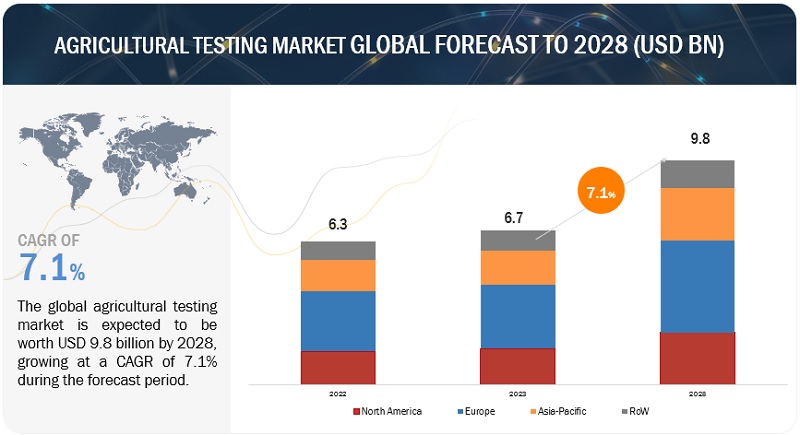The agricultural testing market is projected to grow from USD 6.7 billion in 2023 to USD 9.8 billion by 2028, registering a CAGR of 7.1% during the forecast period. This market encompasses the analysis of various agricultural inputs and products—including soil, water, compost, biosolids, manure, and seeds—to evaluate their quality, composition, and presence of contaminants. Agricultural testing plays a critical role in ensuring food safety, enhancing crop productivity, and promoting environmental sustainability.

As the global population rises and concerns about foodborne illnesses grow, there is an increasing emphasis on the safety and quality of agricultural outputs. Testing enables the detection of harmful substances such as pesticides, pathogens, heavy metals, and other contaminants, allowing for proactive risk management and compliance with food safety standards.
Technological advancements have significantly enhanced the speed and accuracy of agricultural testing. Innovations such as remote sensing, DNA analysis, and rapid diagnostic methods have streamlined the testing process and reduced turnaround times, enabling more efficient decision-making in the agricultural sector.
Agricultural Testing Market Growth Drivers
- Stringent Regulatory Standards: Governments across the globe are imposing tighter regulations on pesticide use, fertilizer content, and soil quality. Compliance with standards like EU REACH, EPA, and ISO certifications is fueling demand for lab-based agricultural testing.
- Growing Awareness of Soil Health: Farmers are increasingly recognizing that healthy soil is the foundation of long-term productivity. Regular soil testing helps optimize input use, reduce over-fertilization, and boost yield.
- Food Safety Concerns: Rising incidences of foodborne illnesses and contamination have made product traceability and quality assurance non-negotiable, especially for exporters.
- Sustainable Farming and Organic Agriculture: As organic farming grows, so does the need for precise testing to ensure farms remain free from synthetic inputs and contaminants.
Download PDF Brochure: https://www.marketsandmarkets.com/pdfdownloadNew.asp?id=203945812
Water Testing: Fastest-Growing Segment by Sample
Water testing is anticipated to be the fastest-growing segment in the agricultural testing market. As water is vital for irrigation, its quality directly influences crop health and yield. Testing for parameters such as pH, salinity, nutrient levels, heavy metals, and microbial contaminants ensures its suitability for agricultural use. Poor-quality water can damage crops, degrade soil, and harm irrigation infrastructure.
Moreover, the widespread use of agrochemicals—like pesticides and herbicides—can result in chemical runoff that contaminates water sources. Regular water testing helps detect and control these residues, supporting both regulatory compliance and the health of surrounding ecosystems.
Safety Testing: Fastest-Growing Segment by Application
Safety testing is expected to witness the highest growth rate by application during the forecast period. Agricultural products must meet stringent domestic and international safety regulations. Failure to comply can lead to product recalls, reputational damage, legal issues, and restricted market access.
Safety testing not only helps ensure regulatory compliance but also facilitates global trade. Exporters must meet the import standards of their destination countries and often need to provide documentation confirming their products have undergone safety testing. This growing need for global market access is fueling demand for safety testing services.
Request Sample Pages: https://www.marketsandmarkets.com/requestsampleNew.asp?id=203945812
Asia-Pacific: Fastest-Growing Regional Market
The Asia-Pacific region is projected to be the fastest-growing market for agricultural testing. Home to densely populated nations such as China and India, the region faces rising food demand, driving the need for high-quality agricultural production.
Rapid industrialization and urbanization in the region have led to pollution and increased pressure on agricultural land. These challenges highlight the importance of agricultural testing in detecting contamination and preserving the safety and productivity of crops. Testing supports sustainable agricultural practices amidst growing environmental and population pressures.
Top 10 Companies in the Agricultural Testing Market
- SGS (Switzerland)
- Eurofins (Luxembourg)
- Intertek (UK)
- Bureau Veritas (France)
- ALS Limited (Australia)
- TUV Nord Group (Germany)
- Merieux (US)
- AsureQuality (New Zealand)
- RJ Hill Laboratories Limited (New Zealand)
- SCS Global (US)